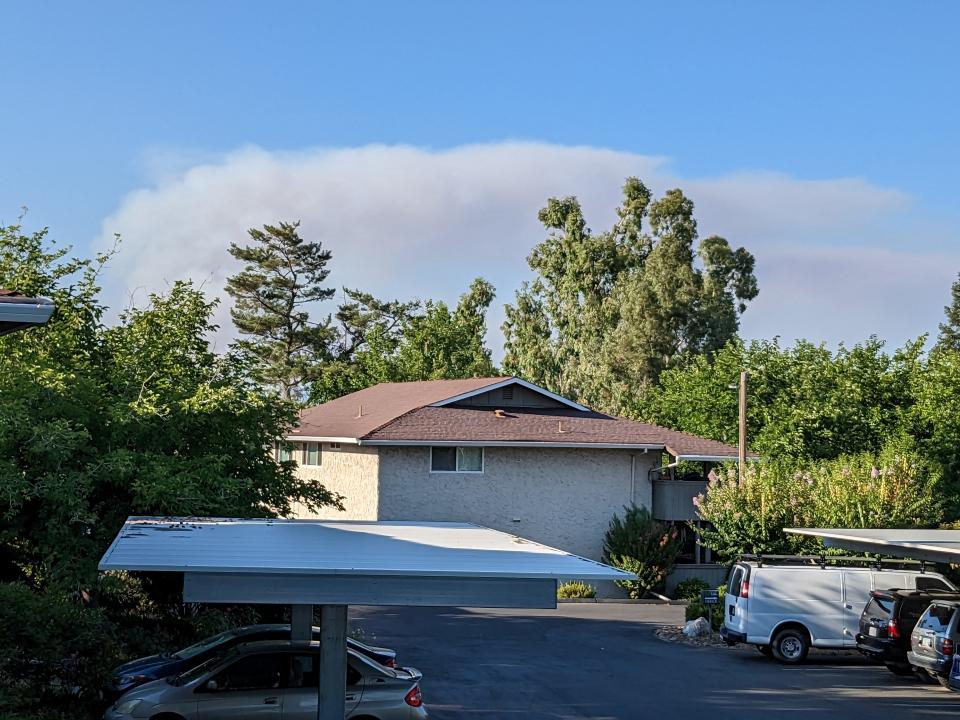How smoke from the Wonder Fire is affecting North State air
Shasta Lake and north Redding residents woke up to air choked with smoke from the Wonder Fire on Tuesday morning.
The worst air tracked in Shasta County was in Shasta Lake, where pollution reached levels considered unhealthy for all people, according to the EPA's AirNow air quality reports.
Communities in north and east Redding also breathed smoky air with moderate pollution levels Tuesday morning, according to the EPA.
Light north winds blew wildfire smoke south over Redding and Shasta Lake, according to meteorologist Sara Purdue at the National Weather Service's Sacramento branch. Those winds will return and Redding residents will likely wake up to smoke on Wednesday morning, she said.
By Tuesday and Wednesday afternoon, winds out of the south will pick up, reaching five to nine mph. These will push the smoke north, probably over Lake Shasta, Purdue said.

Note to readers: We’ve made this story free as an important public service. If you are able, help power local journalism. Subscribe to the Redding Record Searchlight.
Smoky skies probably won't help curb the heat. While smoke is blocking some sunlight from reaching the ground, it's also absorbing the sun's heat. Temperatures will still reach highs of 101 degrees on Tuesday, 99 degrees on Wednesday, Purdue said.
Pollution in wildfire smoke is bad for everyone, but children, pregnant women, the elderly and people with respiratory, heart and other conditions are especially vulnerable to bad air, according to the California Air Resources Board.
Even when pollution levels are moderate, smoke can cause health problems including irritated throat, lungs and eyes and can trigger conditions like asthma, the board cautioned.
Here's why we don't always smell smoke when air is polluted, how people can check their town's air quality and steps to take to avoid polluted air.
Why air quality can be bad when we don't smell smoke, and vice versa
Wildfire smoke is "a complex mixture of air pollutants" and "is unhealthy to breathe," according to the California Air Resources Board.
Even if you don't smell the smoke, air could be polluted. That's because you can’t always smell those dangerous pollutants, according to the EPA.
Air quality experts don't just measure the amount of smoke in the air, they look at the amount of fine particulate matter (PM 2.5). According to the EPA, particles come from a variety of sources, including fires. “Particulate matter contains microscopic solids or liquid droplets that are so small, they can be inhaled and cause serious health problems,” according to the EPA’s PM 2.5 pollution website.
Smoke from fires can send large amounts of PM 2.5 into the air, and over large areas. “Whenever things burn there’s a mixture of gases and particles,” said University of California, San Francisco pulmonologist Dr. John Balmes, an expert on the respiratory and cardiovascular effects of air pollutants. “When you smell smoke, you're smelling the gases in the air, not PM 2.5. They go hand-in-hand near the fire source, but the particulates travel in the upper atmosphere,” Balmes said.
That's why it’s possible to have bad air — air high in PM 2.5 — without smelling gases, and vice versa, he said.
What to do when air is polluted
Public health experts recommend people limit outdoor activities when possible, and stay indoors with windows and doors closed. Turn on an air conditioner with a re-circulation setting.
When pollution levels are high, even healthy people should reduce the amount of time they spend outdoors, the EPA warned. If you do go out, avoid strenuous activities, like running, the EPA said.
Any damage caused by particulates in healthy adults usually heals after the smoke clears, Balmes said.
Where to check your local air quality
The EPA's AirNow website reports how much particulate matter is in an area’s air. It also offers health and lifestyle advice based on that result. Go to www.airnow.gov and enter your zip code.
Print out a copy of the EPA's Air Quality Index Guide at bit.ly/3aNtw5X.
Jessica Skropanic is a features reporter for the Record Searchlight/USA Today Network. She covers science, arts, social issues and news stories. Follow her on Twitter @RS_JSkropanic and on Facebook. Join Jessica in the Get Out! Nor Cal recreation Facebook group. To support and sustain this work, please subscribe today. Thank you.
This article originally appeared on Redding Record Searchlight: How Wonder Fire smoke is affecting far Northern California air quality

